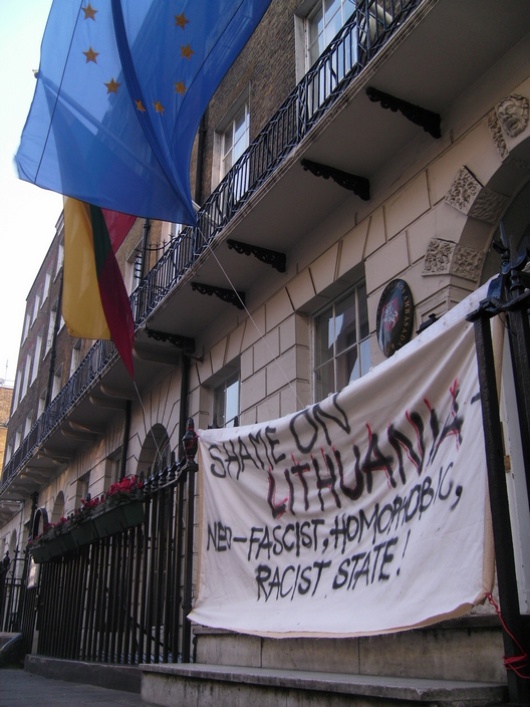London reacts to fascism in Lithuania
Published on
London, which is home of probably more than 70 thousand Lithuanians (forgot the exact statistics), has already seen some reaction to the rise of neo-fascism in Lithuania and the way local and national governments responded to it.
London, which is home of probably more than 70 thousand Lithuanians (forgot the exact statistics), has already seen some reaction to the rise of neo-fascism in Lithuania and the way local and national governments responded to it.
 On one hand, it's a positive message, because politicians are always more sensitive to "European pressure" than legitimate demands of their own electorate. However, I have a problem with this poster:
On one hand, it's a positive message, because politicians are always more sensitive to "European pressure" than legitimate demands of their own electorate. However, I have a problem with this poster:
Image borrowed from Indymedia.org.uk
Equating politicians and several groups with the state is not the way independent media should take. But this is only a part of the problem. The worst thing is that accusations against the state serve to alienate the society against anti-fascist forces. Activists just have to realise that the majority of people are somewhere in between and don't have a strong opinion. However, they will, if they feel collectively accused of something they did not take part in. Every verbal attack only provokes defense, while the goal should be to win these people to the anti-fascist side. Activists in Lithuania and abroad should realise that at least half of the hatred of neo-nazis, the so-called "patriots" and people who partly support them is directed not at homosexuals or ethnic minorities, but at "Brussels bureaucrats". It's a very convenient scapegoat - they won't bother to defend themselves verbally, and there is no way for the nazis to fight them directly, thus, no way to win or lose. Much of the nationalist rhetoric is directed not only at homosexuals and ethnic minorities, but at the aforementioned bureaucrats, forcing everybody to "tolerate" them. The neo-nazis are happy to shout agains what they perceive as forcefully imported tolerance, which some of them compare to Christianity, brought to Lithuania by force in the Middle ages. Unsurprisingly, the nationalists chose decapitated and bleeding Bruno, a Christian martyr whose death brought the first mentioning of Lithuania's name - something that we are shamefully made to celebrate this year. Similarly as what happened in the Middle ages, Europeanisation is perceived by the nationalists as a strategy of the elite, which ignores the uniqueness of the locality and preferences of the people.
Anyway, I have already hinted at the fact that the celebration of the first mentioning of Lithuania's name (de facto - the act of terror against Bruno and his companions) is official, and the reluctance of the government to allow any pro-tolerance demonstrations, combined with their blindness regarding what the nationalists do, is also official. Thus, the state, understood as state apparatus, is involved and can legitimately be blamed for being homophobic, racist and what not. However, one must bear in mind that the state is typically understood as a set of territory, population AND the apparatus. People will feel threatened and try to defend in the following way - "Who are you to tell me that?"
I would invite activists rather express solidarity with non-nationalist Lithuanians, who are indeed systematically compromised abroad by this neo-nazism, and harassed by the nationalists.



